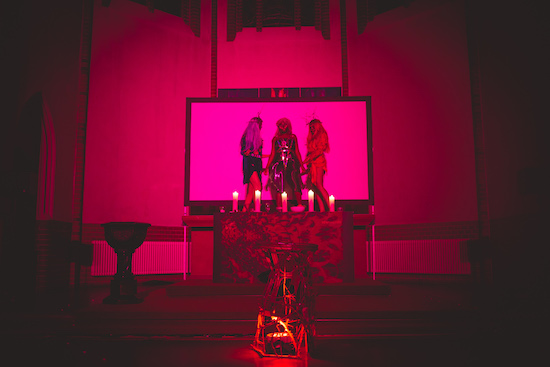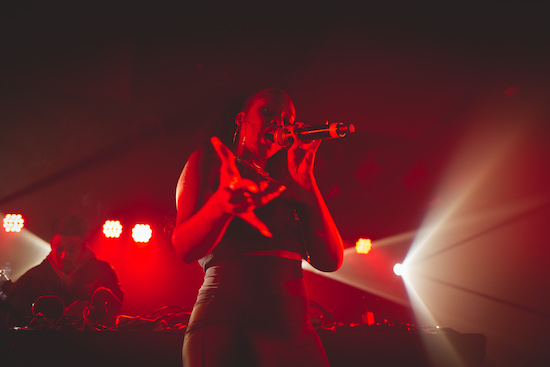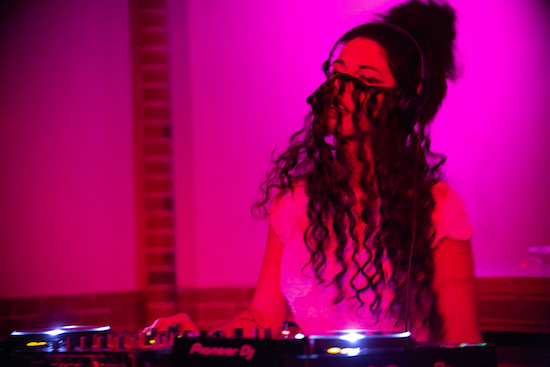It’s Halloween night. Taborkirche, a cold old spacious protestant church is exhumed by magenta light until it is brimming with queerness. Copious velvet, PVC coats, septum piercings, buzzcuts, flamboyant eyeshadow, false lashes, and multicoloured hair all gives me an impromptu thought, "This ain’t Christ-like." A room filled with LGBTQ+ people who have been so often the butt of persecution from the faith, reclaiming a holy space as their own. Dice festival couldn’t be further from evangelism, It’s very much a progressive safe space in every sense. This is the kind of thing even as a queer person – perhaps due to my own issues with my identity – I’d always been skeptical of. Upon arrival, everyone is asked to write their names and pronouns on their lanyards. It’s the kind of festival which would make Piers Morgan glow an even warmer hue of pink than the one which is illuminating the church.
Nonetheless, perhaps due to issues with my own internal struggles with identity, I’d always hated the idea of needing a space to protect me from the dark and nasty outside world. The idea made me feel weak and powerless. However I’d be lying if I said I felt safe navigating unfamiliar streets of Berlin at night alone. I was met with huge amounts of catcalling animosity and varying degrees of transphobia. This kind of hostility makes a safe space a necessity.
During the day, Dice is a conference in which various intersectional and social causes are discussed and with the voices of marginalised folk being highlighted through means of panel talks, lectures, and performances. Journalist Caren Miesenberger brings her Feminist Meme School workshop which brings about the discourse on the political impact of memes. She invites the audience to participate and create some themselves, it’s subtly goofy but, wholesome, engaging and important too. Sound-artist Lyra Pramuk gives a talk on the influences of her composition, which includes the likes of Steve Reich, Bartok, Schubert, and various Russian folk artists. While she plays snippets, you can’t help but reflect that it is engrossing to see a musician be so overt and honest about inspiration in an age when referencing is so candidly called into question. On a personal note, what I found truly compelling about her was she’s a trans woman yet classically trained baritone singer which in and of itself comes with its own set of subversive connotations. As part of her talk she discusses the tribulations that come from within the conservative world of classical music itself.
Juliana Huxtable is one of the most eloquent speakers of the festival and one of the best I’ve ever witnessed. The multi-craft auteur presents attendees with a type of autobiographical manifesto for her art. She talks of sexualised female video game characters like Chun-Li as muses for aggression against masculinity. Her discourse is great and better viewed through Gen-z tinted spectacles, the body and the internet are used in a way that provokes radical thought and transgressive art. She also talks about nightlife being a kind of alternative reality untethered from the chains of transactions and rigid expression. I found this microcosmic of Dice itself, in an outside world that feels so hazardous the event is solicitous and inviting.

For almost the entirety of these talks, the church is lit pink. Once the outside darkness has fallen there’s music from the likes of Ipek Gorgun who plays some the fateful ambient music from her 2018 record Ecce Homo. Sanni Est spins forward-thinking Latin dance music in bridal white lace after dousing the audience in perfume. On Halloween, the visual calm is quelled by a ‘witch’ of sorts who startles the crowds as she enters the space from behind the pews, there are three of them in fact. Their incantations are reverberant, as they concoct potions and dance erratically but beautifully. They are part of the House of Living Colors and Berlin’s first BPOC drag collective. Their performance is pulsating in its ritual splendour. The group of three appears again later on the club Bi Nuu – the night-time counterpart of Taborkirche at Dice.
Bi Nuu is an altogether different affair, unseated and energetic. Golin, gives a set that comes across like a kind of postmodern representation of a J-pop idol. She smiles and dances, flawlessly and ecstatically. But there’s something melancholic about this performance, it has an ominous undertone which is partly brought on by the futurist sensibility of her music itself. It recalls some of the dance scenes in Perfect Blue and subsequentlyBlack Swan or even Gaspar Noe’s Climax. It’s beautiful but chilling. The peculiarity of the set is cemented by an unexpectedly abrupt ending, with Golin leaving head hung low to the left of the stage. She couldn’t be more different from the two artists she’s sandwiched in between, the fantastic Rahrah Gabor whose tongue in cheek approach to being a trans rapper is fiery and funny. Tucking, Prada and various brags about how much dick she gets manifest in her bars, Rahrah Gabor is a unwaveringly fun and ostentatious performer, even when she fluffs a freestyle she makes she does it with a kind elegant ease.

Shygirl’s performance is excellent. She’s probably one of the biggest names on the lineup and lives up to her headline billing. Live she takes everything that’s so good about her music and amplifies it tenfold. Everything hits harder and the jittery bangers ‘O’ and ‘NASTY’ become deconstructed club chaos as she blends industrial beats with her charming lackadaisical delivery. She’s quite possibly the festival highlight. (Although closely rivalled by Ami Dang who sonically explores her heritage as a South-Asian artist hailing from Baltimore. She does this through the means of fusing sitar with ambient soundscapes. Her vocals aren’t perfect but even during the moments when they falter, she reveals much more in the way of emotion. Staring around Bi Nuu it looks as if the crowd is about to burst into tears – It’s a tender moment.
Then unfortunately it was time to leave – I have no doubt the dancing continued to grow in intensity well into the next day. But being in an environment that was tolerant, accepting and tranquil, even if just for a while, was a welcome break from the persecution trans people, POC, women, non-binary and queer people face in their daily lives.


